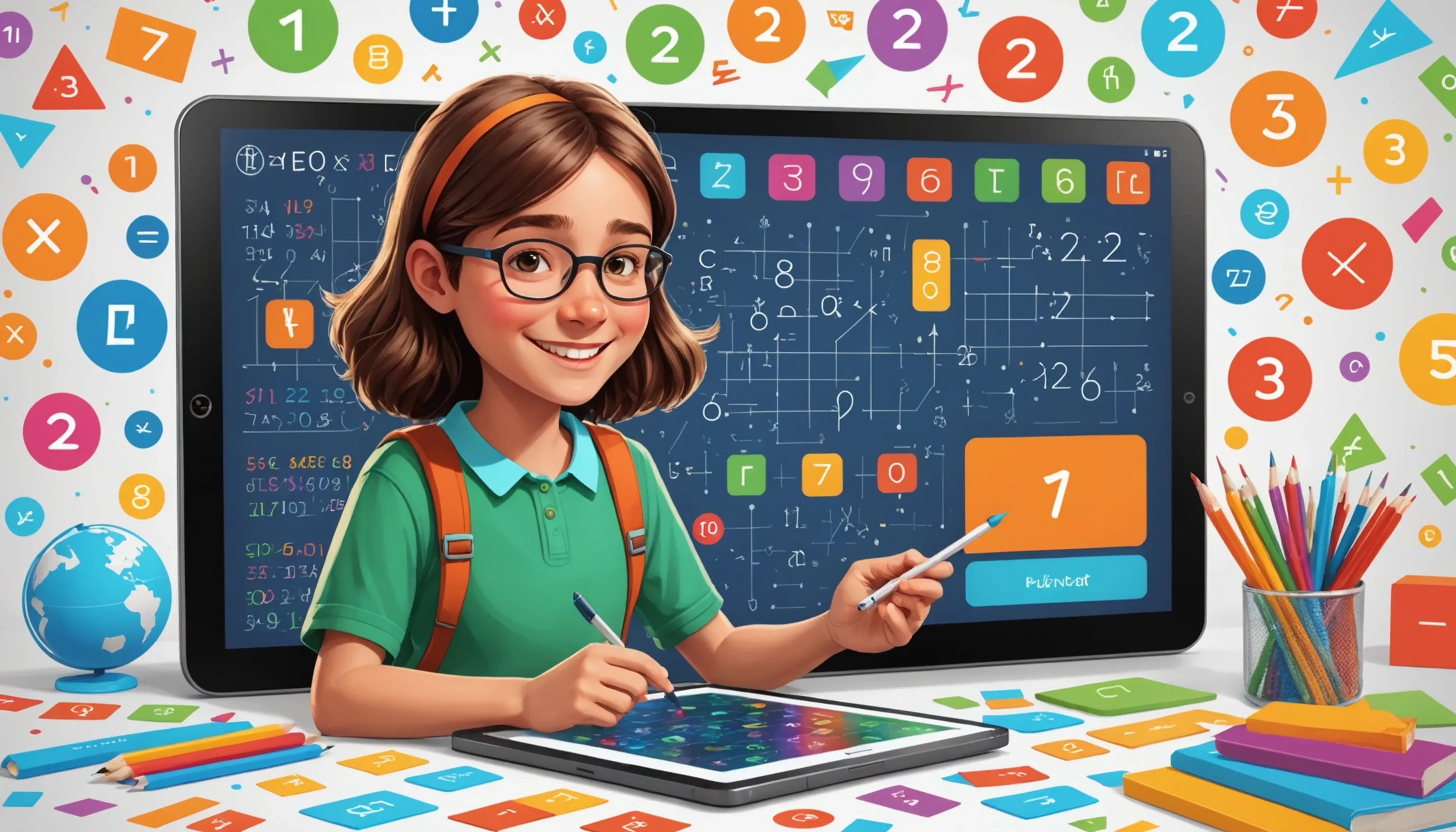Free Math Learning Games to Play
 HvWHenry van Wagenberg
HvWHenry van Wagenberg
Free Math Learning Games for Teens
Free math learning games for teens offer an engaging way to grasp complex concepts while having fun. These games encourage critical thinking & problem-solving skills, making math less intimidating. Many online platforms provide interactive games that cover a range of topics, from algebra to geometry.
By incorporating these games into study routines, teens can improve their understanding & retention of mathematical principles. Plus, the competitive aspect of these games often motivates students to practice more, turning what might seem like a chore into an enjoyable experience.
Benefits of Using Math Games in Learning
Using math games in learning provides numerous benefits that can enhance a teen's educational experience. First and foremost, these games make learning enjoyable, transforming what can often be a tedious subject into an exciting challenge. This increased engagement can lead to improved motivation among students, making them more inclined to tackle difficult math topics.
Moreover, math games encourage active learning. Instead of passively absorbing information, students actively participate in problem-solving scenarios, which helps deepen their understanding. This hands-on approach aids in the retention of mathematical concepts, as students can immediately apply what they've learned in a fun context.
Another significant advantage is the development of critical thinking & analytical skills. Many math games require players to think strategically and make decisions based on their knowledge. This kind of cognitive engagement promotes the ability to analyze problems and devise solutions, skills that are valuable beyond the classroom.
Additionally, these games often incorporate elements of competition, whether with peers or through self-assessment. This competitive edge can motivate students to improve their performance, as they strive to beat their own scores or those of others. Furthermore, math games can be tailored to different learning levels, allowing each student to progress at their own pace.
In summary, incorporating math games into the learning process not only makes education enjoyable but also enhances comprehension, critical thinking, and motivation in teens.
Top Free Math Learning Games
There are several top free math learning games that can significantly enhance a teen's understanding of mathematics. One popular option is Khan Academy, which offers a wide range of interactive exercises and instructional videos tailored to different skill levels. Another great choice is Prodigy Math, a game that combines math practice with an engaging fantasy adventure, allowing students to solve problems while exploring a virtual world.
Math Playground is also a fantastic resource, providing various math games that cover topics like fractions, geometry, and problem-solving. These games not only make learning fun but also allow students to practice at their own pace.
Utilizing these top free math learning games can help teens build confidence in their math skills while enjoying the learning process.

Khan Academy
Khan Academy is a leading online educational platform that offers a comprehensive suite of resources for students, particularly in mathematics. This free resource is designed to help learners of all ages, including teens, master various math concepts through a combination of instructional videos, practice exercises, and personalized learning dashboards.
One of the standout features of Khan Academy is its vast library of content, covering topics ranging from basic arithmetic to advanced calculus. Each topic is broken down into manageable units, allowing students to progress at their own pace. The engaging videos simplify complex concepts by using clear explanations and visual aids, making it easier for teens to grasp challenging material.
Additionally, Khan Academy incorporates interactive practice problems that provide instant feedback, enabling students to identify their strengths & weaknesses. This real-time assessment helps them focus on areas that need improvement, enhancing their overall learning experience.
The platform also offers a unique feature called Mastery Learning, which encourages students to achieve mastery in a subject before moving on to more advanced topics. This ensures a solid foundation in mathematics, crucial for success in higher-level math courses.
In summary, Khan Academy is a valuable tool for teens seeking to improve their math skills, offering a structured and enjoyable way to learn while fostering independence and confidence in their abilities.
Prodigy Math
Prodigy Math is an innovative and engaging online platform that combines math learning with a fun, interactive gaming experience. Designed specifically for students in grades 1 through 8, Prodigy Math captures the attention of teens by immersing them in a fantasy world where they can embark on quests and adventures while practicing essential math skills.
What sets Prodigy apart is its adaptive learning technology. As students play, the game assesses their skill levels and adjusts the difficulty of the math problems accordingly. This personalized approach ensures that each learner is appropriately challenged, enabling them to build confidence and competence in their mathematical abilities.
Prodigy Math covers a wide range of topics, including addition, subtraction, multiplication, division, fractions, and more, aligning with common core standards. The game encourages students to solve math problems to progress through the storyline, making learning feel less like a chore and more like an exciting adventure.
Additionally, Prodigy offers valuable insights for parents and teachers, allowing them to track students' progress and performance in real-time. This feature helps educators identify areas where students may need extra support, fostering a collaborative learning environment.
In summary, Prodigy Math is a powerful tool that effectively blends education with entertainment, helping teens develop a strong foundation in math while enjoying the learning process.
Math Playground
Math Playground is an interactive online platform that offers a variety of free math games, puzzles, and activities tailored for students, particularly for those in elementary and middle school. The site is designed to make math learning enjoyable while reinforcing essential skills. Here are some key features of Math Playground:
- Diverse Game Selection: The platform provides a wide range of games covering various math topics, including:
- Arithmetic
- Fractions
- Geometry
- Problem-solving
- Interactive Learning: Math Playground incorporates engaging visuals and interactive elements that encourage students to participate actively in their learning process.
- Skill Levels: Games are categorized by skill levels, allowing students to choose activities that match their current understanding and abilities, promoting a personalized learning experience.
- Real-time Feedback: As students play, they receive immediate feedback on their performance, helping them identify areas for improvement and reinforcing their understanding of mathematical concepts.
Furthermore, Math Playground includes logic puzzles and brain teasers, which enhance critical thinking skills and foster a love for math. Teachers can use the site as a supplementary resource in the classroom, while parents can encourage their teens to explore the games at home.
In summary, Math Playground is a valuable resource for teens looking to improve their math skills in a fun and engaging way.

How to Incorporate Games into Math Learning
Incorporating games into math learning can significantly enhance students' engagement and understanding. Here are some effective strategies:
- Use Online Platforms: Leverage websites like Khan Academy and Prodigy Math that offer interactive math games tailored to various skill levels.
- Incorporate Board Games: Use traditional board games that involve math concepts, such as Monopoly or Math Bingo, to make learning fun.
- Gamify Assignments: Create challenges or competitions where students earn points or rewards for completing math tasks.
By integrating games, learning becomes enjoyable, motivating students to practice more.
Setting Learning Goals with Games
Setting learning goals with games can significantly enhance a student’s mathematical skills while maintaining their motivation. When integrating games into the learning process, it’s essential to establish clear and achievable goals that align with the curriculum. Here are some effective strategies for setting learning goals using games:
- Define Specific Objectives: Start by identifying the math concepts or skills that need improvement. For example, focus on mastering fractions, improving multiplication skills, or enhancing problem-solving abilities.
- Use Game Metrics: Many online math games, such as Prodigy Math and Khan Academy, provide metrics and progress tracking. Set goals based on these metrics, like achieving a certain score or completing a specific number of levels.
- Incorporate Timeframes: Establish a timeline for achieving these goals. For instance, students could aim to improve their scores over a month or complete a series of games by the end of the week.
- Encourage Reflection: After completing a game, encourage students to reflect on their performance. Ask them what strategies worked, what challenges they faced, and how they can improve next time.
By setting clear learning goals, students are more likely to stay focused and motivated. Combining the enjoyment of games with structured objectives helps them take ownership of their learning journey, ultimately leading to greater success in math.
Creating a Fun Learning Environment
Creating a fun learning environment is essential for engaging students, especially when it comes to subjects like math. By incorporating games and interactive activities, educators can transform the classroom into a lively space that fosters enthusiasm for learning. Here are some strategies to enhance the learning atmosphere:
- Incorporate Interactive Games: Use various math games that encourage participation. Online platforms like Prodigy Math and Math Playground offer exciting and interactive experiences that captivate students’ attention.
- Utilize Group Activities: Encourage collaboration by organizing group games or math challenges. This promotes teamwork & communication while making learning enjoyable.
- Implement a Reward System: Introduce a points or rewards system to acknowledge achievements. Recognizing students for their efforts can boost morale and motivate them to engage more actively in their learning.
- Create a Comfortable Space: Design a classroom layout that allows for movement and interaction. Comfortable seating and designated areas for group work can enhance collaboration and creativity.
- Encourage Creativity: Allow students to create their own math games or challenges. This fosters ownership of their learning process and encourages them to think critically.
By combining these strategies, educators can cultivate a vibrant learning environment where students feel motivated and excited about math. A fun atmosphere not only enhances comprehension but also builds a positive attitude toward learning that can last a lifetime.
Tracking Progress with Game-based Learning
Tracking progress with game-based learning is a crucial aspect of ensuring that students are effectively mastering mathematical concepts. By utilizing games, educators can monitor student performance in a fun and engaging way. Here are some effective methods for tracking progress:
- Utilize Built-in Analytics: Many online math platforms, such as Khan Academy and Prodigy Math, offer robust analytics tools that track students’ performance in real-time. Teachers can review metrics such as scores, time spent on each game, and concepts mastered, helping them identify areas where students may need additional support.
- Set Milestones: Establish specific milestones for students to achieve within the games. For example, students could aim to complete a certain number of levels or reach a specific score. Celebrating these milestones can motivate them to continue improving.
- Conduct Regular Assessments: Supplement game-based learning with periodic assessments to gauge understanding. This can include quizzes or informal check-ins that assess the concepts practiced through games.
- Encourage Self-Reflection: After completing games, encourage students to reflect on their learning experience. Ask them to evaluate what strategies worked best and where they struggled, fostering a growth mindset.
- Incorporate Feedback: Provide constructive feedback based on game performance. Discuss strengths and areas for improvement, helping students set personal learning goals.
By effectively tracking progress through game-based learning, educators can ensure that students remain engaged, motivated, and on the path to mastering essential math skills.
